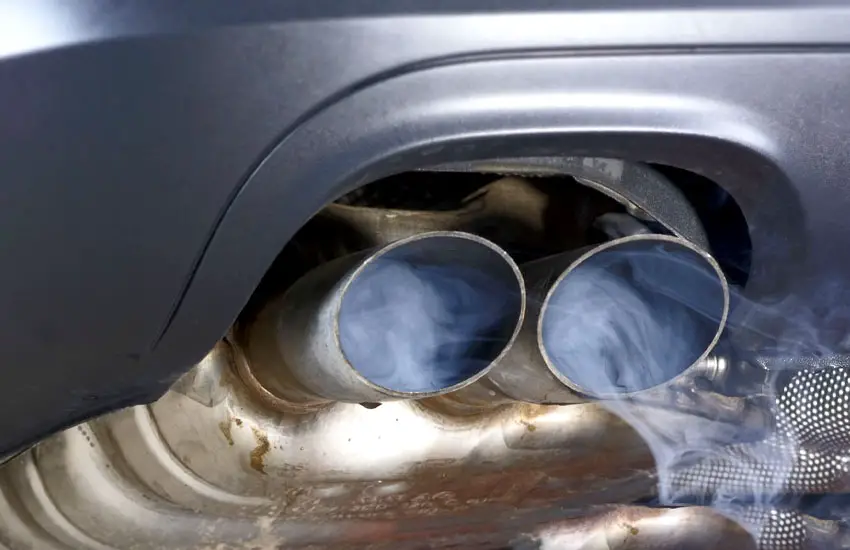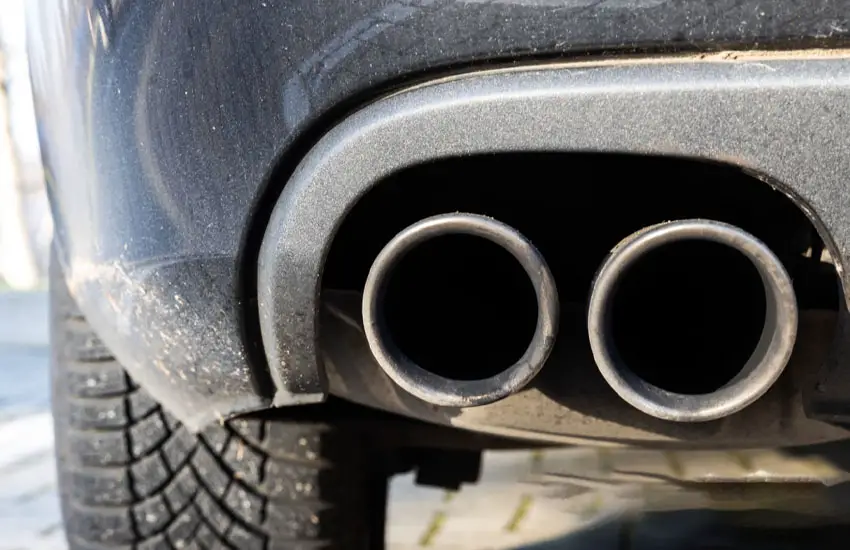As an Amazon Associate, I earn from qualifying purchases at no extra cost to you.
Why Does My Car Exhaust Smell Like Ammonia? Find Out Now!
Every car can sometimes have strange smells, and one of the weirdest is when the exhaust smells like ammonia. This smell can be really puzzling and might make you worry about what’s going on under the hood. Understanding why your car exhaust smells like ammonia is important for keeping your ride in good shape. In this post, we'll explore the reasons behind that ammonia smell and what you can do to fix it. Let's dive in!
Common Causes of Car Exhaust Smell Like Ammonia
If your car’s exhaust smells like ammonia, it can be quite concerning. This smell is not normal and may mean something is wrong with your car. Here are some common reasons why you might notice this smell.
1. Problems with the Catalytic Converter
The catalytic converter is an important part of your car. It helps change harmful gases in the exhaust into less harmful ones. If it is not working well, it can cause a smell like ammonia. When the converter is damaged or failing, it may not clean the exhaust properly. This can lead to strange smells coming from the tailpipe.
2. Low-Quality Fuel
Sometimes, the fuel you put in your car can cause strange smells. If you use low-quality fuel, it may not burn correctly in the engine. This can lead to a smell that is similar to ammonia in the exhaust. Always try to use good-quality fuel to help your car run better.
3. Too Much Fuel in the Engine
If your car is getting too much fuel and not enough air, it is called running “rich.” When this happens, it can create a smell like ammonia in the exhaust. A rich fuel mixture means there is more fuel than the engine needs. This can be caused by problems with the fuel injectors, the air filter, or other engine parts.
4. Coolant Leaks
Another reason for an ammonia smell can be a leak in the coolant system. Coolant helps keep the engine from getting too hot. If there is a leak, coolant can get into places where it shouldn't be, like the combustion chamber. When this coolant burns off, it can create a smell similar to ammonia. It is important to check for any leaks in the cooling system if you notice this smell.
5. Worn Engine Parts
If your car has many miles on it, some parts may be worn out. Worn engine parts may not work as well as they should. This can lead to poor combustion, which means the fuel is not burning completely. When fuel does not burn properly, it can produce unusual smells, including ammonia.
6. Exhaust Leaks
Sometimes, the exhaust system can develop leaks. If there is a leak, unburned fuel and other chemicals can escape. This can create strange smells, including a smell like ammonia. It is important to have any exhaust leaks fixed quickly.
If you notice a smell like ammonia coming from your car’s exhaust, it is best to get it checked out. A professional mechanic can help find the problem and fix it. Taking care of these issues early can save you money and help your car run better. Always pay attention to any strange smells from your car, as they can be a sign that something is not right.

How to Fix Car Exhaust Smell Like Ammonia: The Ultimate Guide
If your car smells like ammonia, it is very important to find out why. An ammonia smell can mean something is wrong with your car. Here are some steps you can take to find the cause and fix the problem.
1. Check the Catalytic Converter
The first thing you should do is check the catalytic converter. This part of your car helps clean the exhaust gases that come from the engine. When the catalytic converter is working correctly, it changes harmful gases into less harmful ones. However, if the catalytic converter is broken or not working right, it can cause a bad smell, including a smell like ammonia.
To check the catalytic converter, you can start by listening for noises. If you hear any rattling sounds when the car is running, this could mean that the converter is damaged. You should also pay attention to your dashboard for any warning lights. If a warning light shows up, it might mean there is a problem with the catalytic converter.
If you suspect that the catalytic converter is causing the smell, it is best to take your car to a mechanic. A mechanic is trained to check this part and see if it needs to be repaired or replaced. It is important to fix this part quickly. If you ignore it, it can lead to more problems and may cause your car to fail emissions tests. Taking care of the catalytic converter will help keep your car running safely and cleanly.
2. Use Good-Quality Fuel
Another reason your car might smell like ammonia is that you are using low-quality fuel. Cheap or low-quality fuel can cause your engine to run poorly. When the engine does not run well, it can create strange smells, including the ammonia smell. To avoid this issue, it is important to choose the right fuel for your car.
When you go to the gas station, look for fuel that is labeled as high-quality or premium. This type of fuel is usually better for your car because it burns more cleanly. You should also try to avoid unknown or generic fuel brands, as they may not provide the same quality. Sticking to fuel brands that you know and trust can help prevent problems in the future.
If you think bad fuel is the reason for the ammonia smell, you can try filling up at a different gas station. Using better-quality fuel can help your engine run more smoothly, which may reduce the ammonia smell coming from the exhaust. Remember, using the right fuel is an important part of keeping your car healthy.
3. Fix a Rich Fuel Mixture
A rich fuel mixture means that your car is getting too much fuel and not enough air in the engine. This can lead to a strong ammonia smell in the exhaust. If your car is running rich, it may produce black smoke from the exhaust, which is a clear sign that there is too much fuel being burned. Additionally, you might notice that you are using more gas than usual, which can indicate that your engine is not operating correctly.
To fix this problem, start by checking the air filter. The air filter helps bring air into the engine, and if it is dirty or clogged, it can block airflow. A clean air filter is important for proper combustion. If the air filter looks dirty or old, it is a good idea to replace it.
Next, you should look at the fuel injectors. The fuel injectors are responsible for spraying fuel into the engine. If they become clogged or damaged, they may not deliver fuel properly, which can lead to a rich mixture. A mechanic can help clean or replace the fuel injectors if necessary. By taking these steps, you can help your engine run more efficiently and reduce the ammonia smell coming from your car's exhaust.
4. Check for Coolant Leaks
Coolant leaks can also cause an ammonia smell in your car's exhaust. Coolant is a fluid that helps keep your engine cool. If there is a leak in the coolant system, coolant can get into the combustion chamber, where it burns and produces a bad smell. It is important to check for any signs of coolant leaks to prevent further problems.
Start by looking under your car for any puddles of liquid. Coolant is often bright green, orange, or pink, so if you see any colored liquid under your car, it may be coolant. Next, check the radiator for any signs of damage or leaks. The radiator is responsible for cooling the engine, and if it has cracks or holes, it can cause coolant to leak.
If you find a coolant leak, it is crucial to fix it as soon as possible. You can try using a product from an auto store to seal small leaks, but for larger leaks, you should take your car to a mechanic. A mechanic can properly diagnose and repair any coolant leaks to ensure that your engine stays cool and does not produce an ammonia smell in the exhaust. Taking care of coolant issues will help keep your car running safely.
5. Inspect the Engine Parts
Worn engine parts can also cause an ammonia smell in the exhaust. If your car has a lot of miles on it, some parts may be worn out and not working properly. To prevent problems, it is important to regularly inspect your engine parts. Start by checking for any oil leaks. Oil can burn and create unpleasant smells, so it is essential to address any leaks you find. Look for signs of oil pooling around the engine or on the ground underneath your car.
You should also check the gaskets in your engine. Gaskets are seals that help prevent oil and other fluids from leaking. If the gaskets are old or worn out, they may need to be replaced. Regular maintenance is key to keeping your engine parts in good shape.
Make sure to change your oil and filter as recommended by your car's manufacturer. Regular oil changes help keep the engine running smoothly and can prevent buildup that might lead to smells. If you are not comfortable inspecting the engine yourself, it is a good idea to ask a mechanic to take a look. They can help identify any worn parts and suggest the best solutions to keep your car running well.
6. Fix Exhaust Leaks
Exhaust leaks can also cause strange smells, including a smell like ammonia. When there are leaks in the exhaust system, unburned fuel and other chemicals can escape, leading to unpleasant odors. To find exhaust leaks, listen for any hissing or popping sounds when your car is running. These sounds can indicate that there is a leak somewhere in the exhaust system.
Next, visually inspect the exhaust pipes and connections for any holes, cracks, or rust. Exhaust pipes can become damaged over time, especially if your car has been driven on rough roads or in harsh weather conditions. If you see any damage, it is important to have it repaired.
If you suspect there is an exhaust leak, it is best to have a mechanic fix it for you. They have the tools and experience needed to identify and repair leaks in the exhaust system. Fixing exhaust leaks will help reduce the ammonia smell and ensure that your car runs efficiently.
7. Regular Maintenance
One of the best ways to prevent ammonia smells in your car is to keep up with regular maintenance. Regular checks and servicing can help catch small problems before they become big ones. Start by changing your oil regularly, as this is one of the most important things you can do for your engine. Follow the manufacturer's recommendations for how often to change the oil and filter.
In addition to oil changes, be sure to replace air filters and fuel filters as needed. A clean air filter allows your engine to get the air it needs for proper combustion, while a clean fuel filter ensures that fuel flows smoothly. You should also regularly check your tires to make sure they are properly inflated and in good condition.
By staying on top of these maintenance tasks, you can help prevent many issues that could lead to an ammonia smell in your car. If you notice any strange sounds, smells, or changes in how your car runs, it is important to address them quickly. Regular maintenance will help keep your car in good shape and make your driving experience safer and more pleasant.
If you notice a smell like ammonia coming from your car's exhaust, it is important to take action. There are many potential causes, but by checking the catalytic converter, using good-quality fuel, fixing rich fuel mixtures, checking for coolant leaks, inspecting engine parts, fixing exhaust leaks, and keeping up with regular maintenance, you can help solve the problem. If you are unsure about any of these steps, it is always a good idea to ask a mechanic for help. Taking care of your car will keep it running well and safe for you to drive.

Are These Questions in Your Mind?
Is it normal for my car to smell like ammonia after driving for a while?
No, it is not normal for your car to smell like ammonia at any time. If you notice this smell, it could indicate a problem with your exhaust system, catalytic converter, or other engine components. It is best to have it checked by a mechanic.
Can a dirty air filter cause an ammonia smell in my car?
Yes, a dirty air filter can cause an ammonia smell. When the air filter is clogged, the engine may not get enough air, which can lead to a rich fuel mixture. This can cause incomplete combustion and result in strange smells, including ammonia.
Do I need to replace the catalytic converter if it smells like ammonia?
Not necessarily. If your catalytic converter is causing the ammonia smell, it may need repair or replacement. However, a mechanic will need to inspect it to determine the exact cause and recommend the best course of action.
Is it safe to drive my car if it smells like ammonia?
It is not safe to drive your car if it smells like ammonia. This smell can indicate a serious problem that could lead to more significant issues, including engine damage or emissions failures. It is best to have it inspected by a professional.
Can a coolant leak cause my car to smell like ammonia?
Yes, a coolant leak can create an ammonia smell. If coolant leaks into the combustion chamber, it can burn and produce a smell similar to ammonia. It is essential to address any coolant leaks immediately.
Do I need to use fuel additives to prevent ammonia smells in my car?
Using fuel additives can help improve fuel quality and combustion efficiency. While they may help reduce unusual smells, they are not a guaranteed solution. It is essential to address any underlying issues with your car first.
Is it okay to ignore the ammonia smell in my car for a few days?
No, it is not okay to ignore the ammonia smell. Delaying action can lead to more severe problems and higher repair costs. It is best to have your car checked as soon as you notice the smell.
Can a faulty oxygen sensor cause an ammonia smell?
Yes, a faulty oxygen sensor can cause an ammonia smell. The oxygen sensor helps regulate the fuel-air mixture in the engine. If it is not working correctly, it can lead to incomplete combustion and result in unusual smells.
Is it possible for an ammonia smell to come from other vehicles or machinery?
Yes, ammonia smells can come from various sources, including agricultural equipment, refrigeration units, and some industrial machines. If you notice an ammonia smell around such equipment, it may indicate a leak or malfunction.
Do I have to take my car to a dealership for repairs related to the ammonia smell?
No, you do not have to take your car to a dealership. Many independent mechanics can diagnose and fix the problem. Just ensure they are experienced and have good reviews for quality service.











